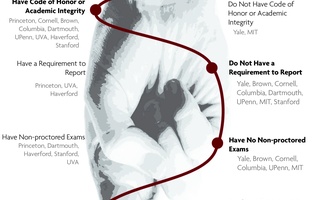Following the rejection last week of the latest proposal for a university judiciary system, Cornell University students, faculty and administrators are finding it difficult to find a new campus code on which they can agree.
With only one-third of its members voting, the University Assembly (UA) rejected a proposed campus code, formulated in large part by a five-member presidential commission that was created after the university was criticized for violating its own student arrest policy.
Hoping to gain approval of the new code, the commission is making minor changes, hoping that when more members of the UA show up for a meeting next week, the body will approve the document.
The 21-member UA last week voted down the commission's version of a campus code by a 4-3 vote, with four members abstaining and ten members absent.
Among the major points of contention members of the university are grappling with are policies regarding campus arrests and student rights.
Many students have contended that when the university violates the campus judicial system, members of the university ought to be able to prosecute Cornell within the school's own system of justice.
In addition, a number of students and faculty members have insisted that a bill of right providing for free speech and assembly for members of the campus community should be built into any judicial code.
Cornell's Board of Trustees is scheduled to vote on the code at its early April meeting. But it is unlikely that the trustees will vote on the code if the UA does not approve it, University Counsel Walter J. Relihan Jr. said yesterday.
If the UA does not approve the proposed code, then "we may have to delay it for another year," Relihan said.
One of the major points of contention in the proposed campus code is its arrest policy statement. Amid the protests that have marked recent years, the university's breach of the current arrest policy by subjecting protestors to the state justice system has caused controversy.
"Our intent is to clarify [the arrest policy] and make it more internally consistent." Relihan said.
The need for a new campus code arises from the vagueness and seemingly nonbinding nature of the present code, which was never officially approved by the trustees when it took effect 16 years ago, even though it was published as an official policy.
Because of the current policy's vagueness, "Administration policies for handling campus unrest are in a shambles," said senior Thomas W. Casparian, a commission member who was arrested in a 1985 divestment protest. "They've really acted in an offensively defensive manner," he said.
Casparian said he thought the proposed arrest policy as currently drafted would be worthless because there are no explicit guarantees that the administration will adhere to it. As they are currently drafted, Casparian said, "The Principles and Policies really are empty promises."
But Relihan said he believes the new Statement on Principles and Policies would be binding and thus would be "a big step forward."
Read more in News
A Fair ChanceRecommended Articles
-
Faculty Still Concerned About Honor Code AffirmationMembers of the Faculty of Arts and Sciences raised concerns about how frequently students would be required to make an affirmation of integrity under an updated proposal for the College’s first-ever honor code, which was presented by Dean of Undergraduate Education Jay Harris to the faculty at their monthly meeting Tuesday.
-
 Honor Proposal Would Catch Harvard Up, Incrementally, With the Times
Honor Proposal Would Catch Harvard Up, Incrementally, With the Times -
Faculty Council Approves Honor Code Proposal, Advancing Legislation to Full FacultyThe legislation will likely go before the full Faculty for a vote next Tuesday.
-
 Honor Code Would Face Tough Challenges in Inculcating Culture Shift
Honor Code Would Face Tough Challenges in Inculcating Culture Shift -
 Faculty Approves College’s First Honor Code, Likely Effective Fall 2015
Faculty Approves College’s First Honor Code, Likely Effective Fall 2015 -
 Honor Code Affirmation Likely to Be Required for Final Exams, Papers
Honor Code Affirmation Likely to Be Required for Final Exams, Papers













